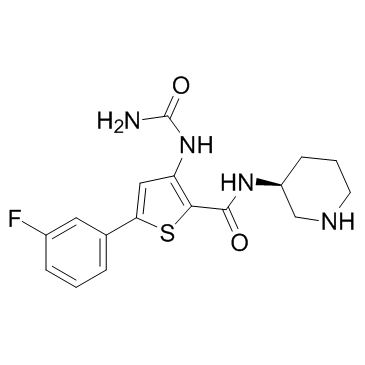| Description |
AZD-7762 is a potent ATP-competitive checkpoint kinase (Chk) inhibitor in with an IC50 of 5 nM for Chk1.
|
| Related Catalog |
|
| Target |
Chk1:5 nM (IC50)
Chk2:5 nM (IC50)
|
| In Vitro |
AZD-7762 (AZD7762) is an equally potent inhibitor of Chk1 and Chk2 in vitro. AZD-7762 potently inhibits Chk1 and Chk2, abrogates DNA damage-induced S and G2 checkpoints, enhances the efficacy of gemcitabine and topotecan, and modulates downstream checkpoint pathway proteins. AZD-7762 potently inhibits Chk1 phosphorylation of a cdc25C peptide with an IC50 of 5 nM as measured by a scintillation proximity assay. The Ki for AZD-7762 is determined to be 3.6 nM. Kinetic characterization suggests that AZD-7762 binds in the ATP-binding site of Chk1 and is thought to compete directly for ATP binding in a reversible manner. AZD-7762 is shown to abrogate the G2 arrest induced by Camptothecin with an average EC50 of 10 nM (n=12) and maximal abrogation in the range of 100 nM[1].
|
| In Vivo |
In the rat H460-DNp53 xenograft study, AZD-7762 (AZD7762) potentiates the antitumor activity of Gemcitabine in a dose-dependent manner by a decrease in %T/C with increasing dose (48% and 32%, 10 and 20 mg/kg AZD-7762, respectively). In the mouse xenograft study in combination with Irinotecan, SW620 established tumors are treated with vehicle, Irinotecan alone, AZD-7762 alone, or AZD-7762 in combination with Irinotecan. AZD-7762 dosed alone shows insignificant antitumor activity, whereas Irinotecan alone displays striking and significant activity (%T/C with increasing dose is 9 and 1, respectively ). In combination with AZD-7762, %T/C increases significantly to -66% and -67%, respectively[1]. AZD7762 combination with CX-5461 induces cancer cell death of Tp53-null (Tp53-/-) Eμ-Myc lymphoma cells in vitro and in vivo[2].
|
| Kinase Assay |
For kinetic analysis, a filter binding assay is used. The assay reaction contains with the following concentrations of ATP [0-600 μM (cold+Ci [33P]ATP), determined Km], Chk1 (0.5 nM), and AZD-7762 (0, 1.5, 5, 10 nM). The reaction is incubated at room temperature for 20 min, stopped by the addition of EDTA, transferred to Streptavidin Flashplate, incubated at room temperature for 1 h, aspirated out, and wells washed with PBS. Plates are counted using a TopCount reader and data are analyzed using proprietary software[1].
|
| Cell Assay |
SW620 (5.5×103 per well) or MDA-MB-231 (5×103 per well) cells are seeded in 96-well plates and incubated overnight. Cells are dosed for 24 h with a 9-point titration of Gemcitabine ranging from 0.01 to 100 nM with or without a constant dose of AZD-7762 (300 nM). Control wells are dosed with vehicle alone (0.1% DMSO) or 300 nM AZD-7762. After 24 h, medium is removed and AZD-7762 alone is added back to the wells treated previously with AZD-7762 for an additional 24 h. Cells are then incubated in drug-free medium for an additional 72 h. The effect on cell proliferation is determined by MTS assay[1].
|
| Animal Admin |
Mice and Rats[1] Male NCr mice and male rnu rats are used. For xenograft models in mice, tumor cells are harvested, pelleted by centrifugation for 5 min, and resuspended in sterile PBS. Cells (3×103-6×106) are implanted s.c. into the right flank of the mice in a volume of 0.1 to 0.2 mL using a 25-gauge needle. Tumors are allowed to grow to the designated size of 100 to 200 mm3 before the administration of compound. For xenograft models in rats, Cells are harvested, pelleted by centrifugation for 5 min, and resuspended in 50% sterile PBS and 50% Matrigel. Rats receive a 5 Gy whole-body radiation dose 5 days before cell implantation to improve tumor growth. H460-DNp53 cells (1×107) are implanted s.c., under anesthesia with isoflurane, into the right flank of the rats in a volume of 0.2 mL using a 25-gauge needle. Tumors are allowed to grow to the designated size of 100 to 200 mm3 before the administration of AZD-7762. AZD-7762 (10 and 20 mg/kg) is administered by i.v. injection via the tail vein. Cyclic schedules are used and treatment ranged from three to five cycles. Each cycle includes administration of a standard agent (Gemcitabine or Irinotecan) every 3 days follow by delivery of AZD-7762. Tumor volumes are measured with electronic calipers and calculated. Mice [2] C57Bl/6 mice are intravenously injected with 2×105 Eμ-Myc B-lymphoma cells in PBS and treated with pharmacological inhibitors from 8 days post-injection. Treatment of mice is continued until an ethical end-point is reached; hunched posture, ruffled fur, enlarged lymph nodes, laboured breathing, weight loss greater than 20% of start body weight and limited mobility or paralysis. AZD7762 is delivered intraperitoneally in 10.3% -hydroxypropyl-β-cyclodextrin in 0.9% saline at 20 mg/kg daily on weekdays.
|
| References |
[1]. Zabludoff SD, et al. AZD7762, a novel checkpoint kinase inhibitor, drives checkpoint abrogation and potentiates DNA-targeted therapies. Mol Cancer Ther. 2008 Sep;7(9):2955-66. [2]. Quin J, et al. Inhibition of RNA polymerase I transcription initiation by CX-5461 activates non-canonical ATM/ATR signaling. Oncotarget. 2016 Aug 2;7(31):49800-49818.
|
